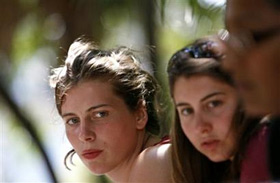 |
 |
 |
 Editorials | April 2006 Editorials | April 2006  
Deciphering U.S. Policy Toward Cuba
 Peter Mckenna Peter Mckenna


| | Molly Morris, left, from Houston Texas and Alexandra Platkin, from York, Pa, take a break after a class day in a garden of the University of Havana, Cuba, Monday, March 13, 2006. Cubans' isolation from the United States has sharpened over the past two years as the U.S. government has increasingly choked off travel to the communist-run nation. (AP/Javier Galeano) |
The U.S.-based Latin American Studies Association (LASA) recently concluded its semi-annual International Congress in San Juan, Puerto Rico. Hundreds of academics, NGO representatives and interested observers from all over the world presented papers on a wide variety of topics — from feminist theory to economic globalization.

However, one of the most glaring omissions from the Congress schedule was the participation of some 60 Cuban scholars. While they were all slated to make paper presentations at several sessions, not one of them was granted a proper visa from the U.S. government — thereby leaving conference organizers with little choice but to cancel some of those panels and meetings.

Topical and thought-provoking sessions on "Cuba: A Special Foreign Policy for a Special Period," "Cuba: Economic Policies for Transition" and "Political and Economic Change in Cuba" were needlessly missing their Cuban participants. Sadly, their absence left no way to engage them in a spirited debate about Cuban politics, the country’s international relations, or the impending "transition" in Cuba.

According to one State Department functionary, "Cuban academic institutions are state-run, and the Cuban government tightly controls the activities of its academic researchers." Moreover, to allow the Cubans to attend, in the words of another U.S. government official, would be "detrimental to the interests of the United States."

Of course, this position looked highly suspect as Cuba’s national baseball team took the field at San Juan’s Hiram Bithorn Stadium — during the same week as the conference proceedings — to play its first series of games in the World Baseball Classic. In a subsequent news story in USA Today, it was quick to point out the simplemindedness of this approach with its punchy headline: "Baseball, si, academics, no."

What all this was really about was a Bush administration obsessed with punishing Cuba and Fidel Castro at every opportunity — no matter how silly or counterproductive the act. It simply can’t bear to bring itself to admit that its policy of confrontation against Cuba has been an unmitigated failure. Better to muddle along in a state of wilful blindness and ignorance than to lose face and acknowledge that Castro has essentially won the undeclared U.S.-Cuba war.

From Washington’s standpoint, the Cuban political and economic landscape can only be changed in a positive way through an economic embargo, tighter restrictions on U.S. travel, and a concerted anti-Cuba propaganda campaign. Internationally, it has sought to squeeze the Cuban government by using the Cuban Democracy Act, the Helms-Burton law, and the Trading With the Enemy Act to pressure other countries into not doing business with Cuba. But even after more than 45 years of a failed and discredited policy approach, the Bush White House is still ostensibly stuck in a Cold War time warp.

On the other hand, two-way trade between Canada and Cuba has almost exceeded the $1-billion mark, people-to-people exchanges have increased dramatically since the early 1990s, and nearly 600,000 Canadians annually trek to Cuba in search of warmer weather. And as a sign of bilateral goodwill, more than one million Cubans participate every February in the Terry Fox run, representing the largest turnout outside of Canada.

For embarrassed LASA conference organizers, they would have preferred the Canadian approach to having to once again explain why the Cubans were not permitted to attend the Congress for the second time in roughly three years. Pressure was brought to bear, however, on conference officials to ensure that this pettiness does not happen next time out at the Boston meetings in 2007. Some even suggested that the next LASA conference should take place on Canadian soil, where the Cubans would not face such ridiculous travel restrictions.

One would hope that the Harper government, should it still be in power, would not mimic the nonsensical U.S. actions. Indeed, Canadians have prided themselves on taking a strikingly different approach to Cuba — opting for engagement and inducements rather than isolation and punishment.

Having said that, there were some concerns raised at the conference about Stephen Harper’s pro-U.S. foreign relations stance on Afghanistan, Israel and on rights abuses at Guantanamo Bay. The prime minister would do well to remember that changing a 45-year-old policy of engaging the Cubans across a wide range of issue areas would be a politically risky undertaking, especially in a minority government situation.

To silence some of those foreign policy critics, then, he may wish to roll out the welcome carpet, should LASA come, for dozens of Cuban intellectuals in the fall of next year.

Peter McKenna is an associate professor in the department of political studies at the University of Prince Edward Island, where he teaches Latin American politics. | 
 | |
 |



